By: Monica Aviles
Sleeping is a vital part of our daily routines, it’s just as important as exercising and eating healthy is. A good amount of sleep grants us energy, better concentration, and improvement within our immune system.
However, many students are facing difficulties within their sleeping schedules. According to the survey taken by Redwood students, about 50% say they have a “poor” sleeping schedules.
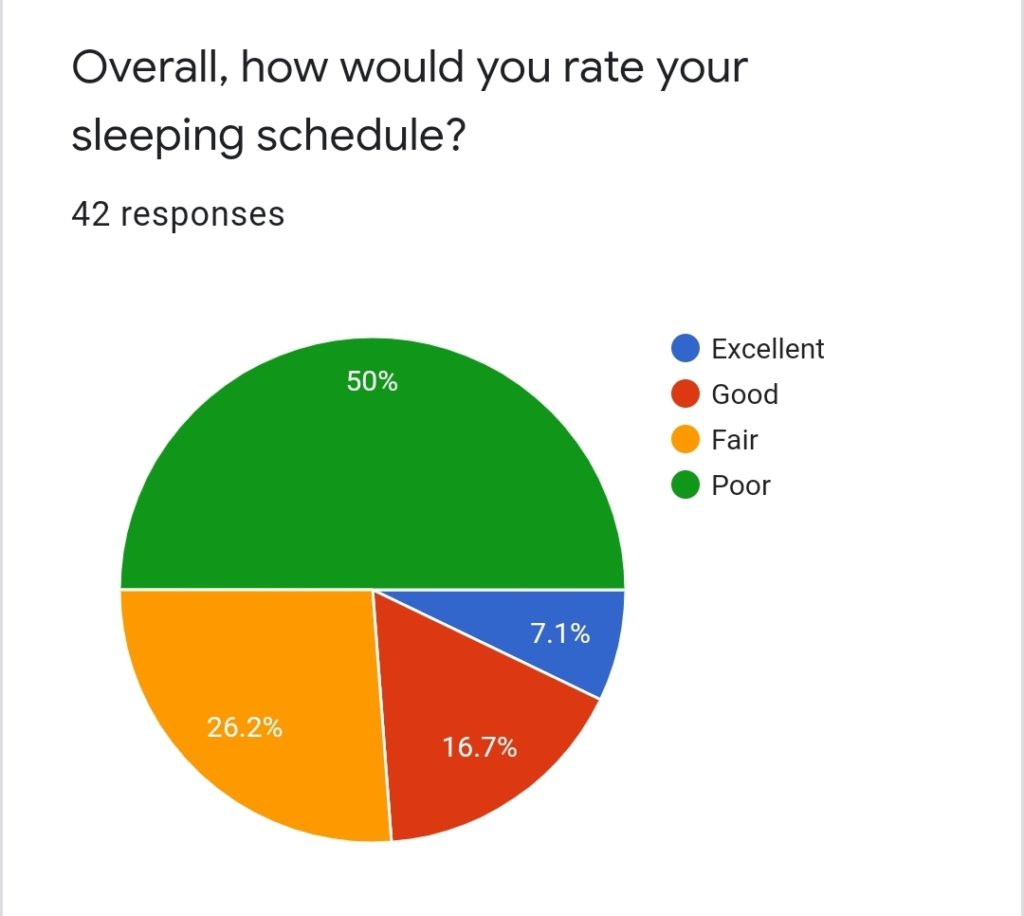
Tiffany Walkowiak, Redwood’s school nurse, has been working at Redwood for five years now. Her roles involve assisting students with injuries, illnesses, and chronic diseases. She also administers medication, creates health care plans, and much more.
Sleep deprivation can lead to both physical and mental consequences. “Lack of sleep puts us at higher risk for illnesses and sickness (such as colds, flu, COVID).”Getting the right amount of sleep helps “our bodies repair themselves during sleep and this rest is vital for our immune system.”
According to Walkowiak, not getting enough sleep regularly can “increase the risk of anxiety, depression, and low self-esteem.” It can also impact you academically, “you won’t do as well on homework or tests. It can also cause difficulty concentrating, shorter attention span, and memory impairment.” Being sleep deprived can also cause several injuries like car accidents and weight gain.
Sleep deprivation can also lead to lack of focus. Survey shows that 42.9% of students say they have somewhat trouble concentrating in class due to staying up late the day before.
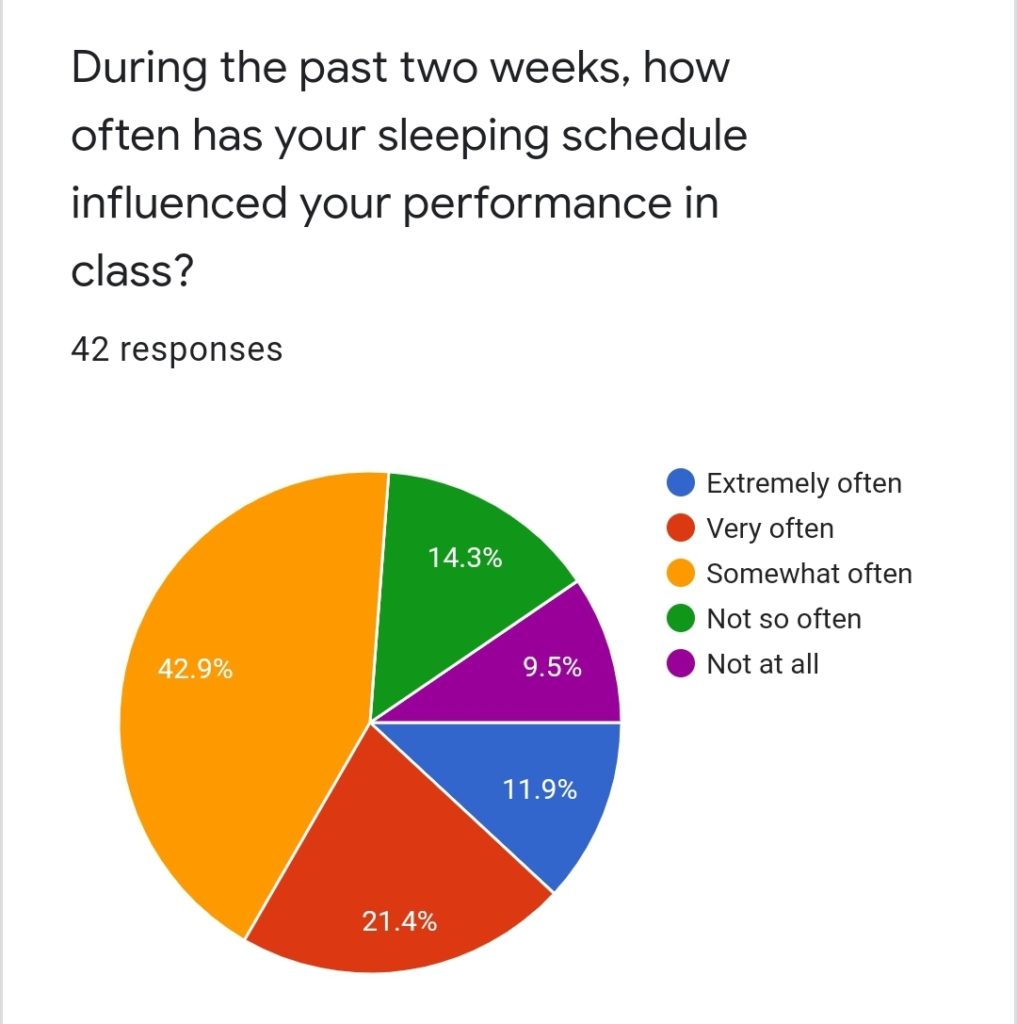
Some reasons Walkowiak believes students stay up late at night are due to: playing video games, staying up on phones, procrastinating on homework/studying, and/or too many after-school commitments. “Getting adequate sleep will help students to be less irritable or cranky, which will help you in your relationships with parents, family, friends.”
There are multiple reasons why students stay up late, here is a chart of the most common answers in the survey:
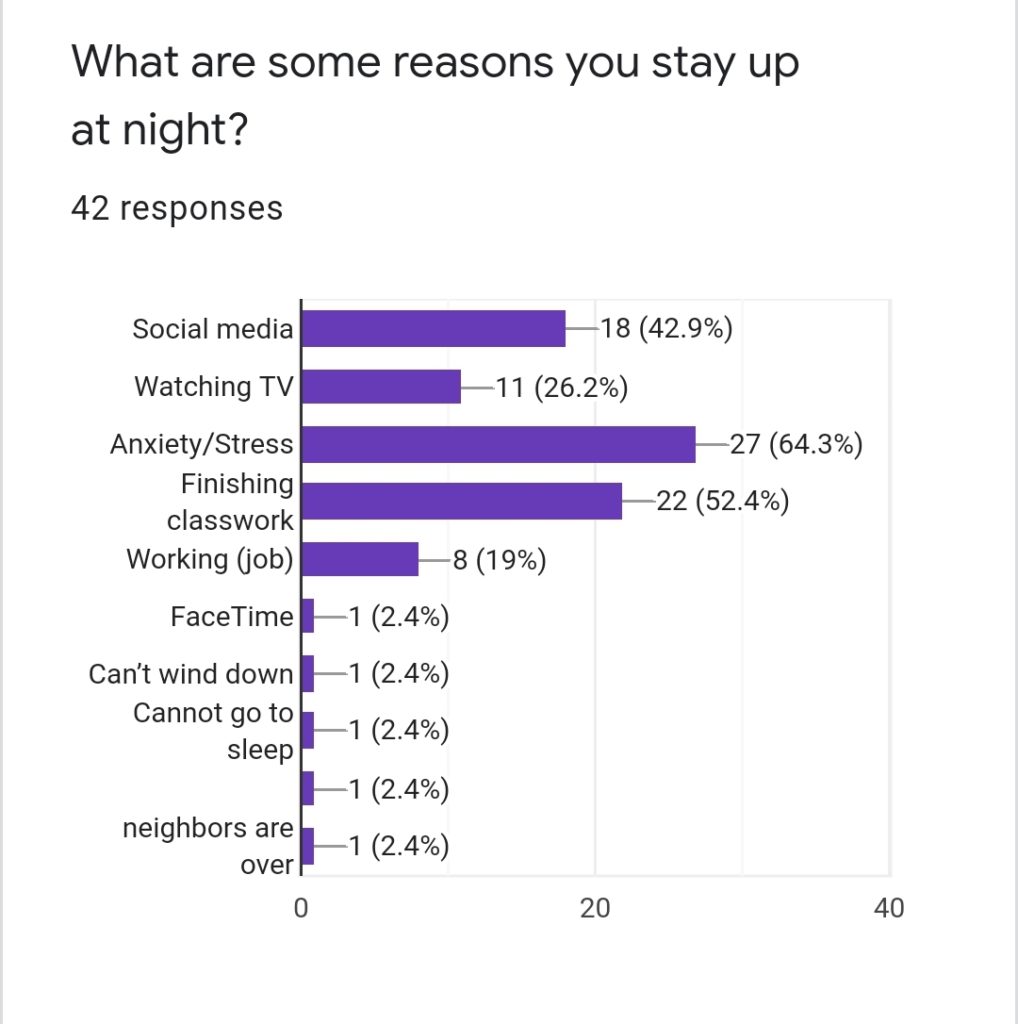
She explains how teenagers should get 8-10 hrs of sleep a night. Taking naps in the daytime can “help you overcome lack of sleep. However if you nap for too long, you may not be tired to sleep at night. Best nap duration is 30-60 minutes.”
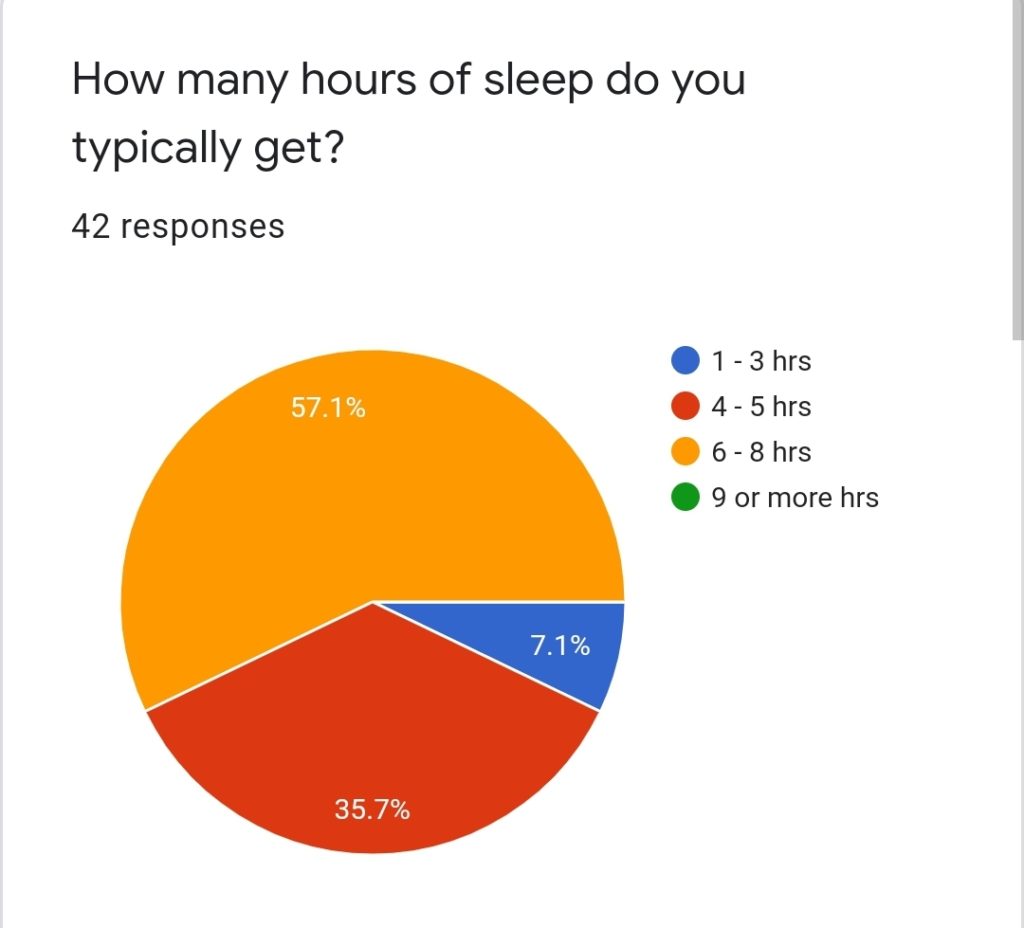
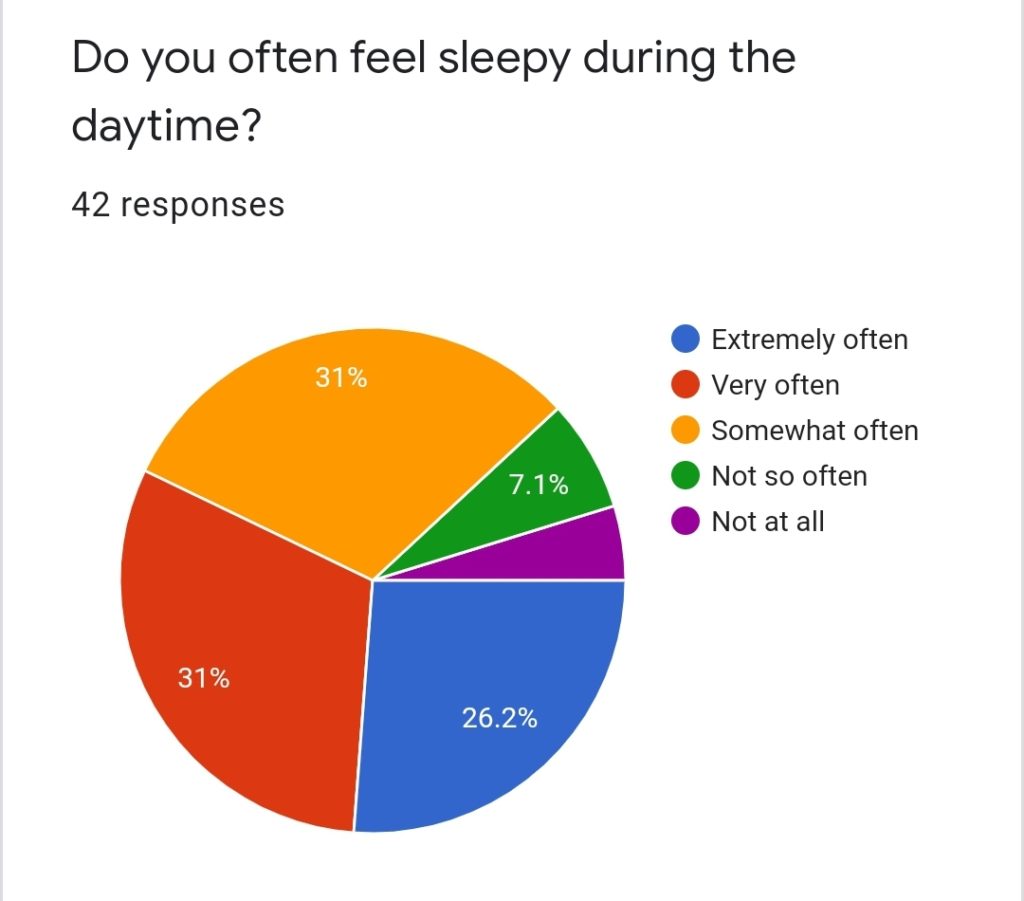
Some tips she has for students to get better rest is to “stay off all screens (phone, computer, tv) at least 30 minutes before, Limit or avoid caffeine consumption in the afternoon/evening (includes energy drinks, coffee, soda), and create a bedtime routine. Also, exercise during the day.”

Chloe Lambert, ‘21, (survey participant) much like other students, struggles to fall asleep at night especially since the pandemic began. She had a very consistent sleeping schedule before the pandemic, but now struggles “to fall asleep before 2am.” Lambert explains how it is probably due to the fact that she would stay up late watching movies and tv shows. She’s also “stuck” with her thoughts often while spending hours trying to fall asleep, “it causes me to overthink situations. Also, being tired all day makes small inconveniences seem bigger than they are.”
“Sleeping provides rest for our bodies and our brains. Without it, we can’t function to our best ability…It can cause stress, failing grades, and physical injuries.” Some ways she hopes to improve her sleeping schedule is by “forcing myself to get in bed and getting up with my first alarm. This should reset my body back to old school habits.”
Something Lambert hopes teachers understand during this current situation is “just because we’ve grown up with technology doesn’t mean that we fully understand it. It’s not fair to us when we get in trouble for our Wifi crashing when we’re just trying to sit in class.”
“I can’t relax anymore. I’m not stressed about school or my extracurriculars, my body just doesn’t want to sleep.” – Chloe Lambert

In contrast to the majority of students, Hailee Vang’s, ‘21, (survey participant) sleeping schedule has changed positively ever since virtual/distancing learning began. She felt more “tired and drained” when public school was in session. Vang would wake up early and go to sleep extremely late due to finishing priorities like homework, cleaning, and working out every night. However, with the new schedule and doing online school, “I’m definitely getting the right amount of sleep.”
With the new schedule, Vang has been getting about 6 – 8 hours of sleep. “The only reason why I stay up at night is because it’s kind of a habit that I do so since I’m so used to it now.” Some things that keep her up at night are social media and Netflix.
Since her sleeping schedule has improved miracuously, “I wouldn’t say my sleeping schedule affects my mental health, it really did when we had to physically go to school because I would always stress about how I don’t have enough time to finish all my work and still have me time.”
Vang hopes teachers understand that most students are still adapting to these new circumstances, schedule, etc. “I know a lot of my peers don’t have good internet or have a quiet environment to learn, so I just hope teachers know that a lot of the students are really trying.” She also hopes teachers know how appreciated they are for always trying to do their best, “let’s just hope things get better soon, so we could go back to our daily norms.”
“Sleeping is really vital for our everyday and daily life because this is how we get our energy to perform efficiently for the next day. Plus sleeping is also a good way for us to just relax and take a break since life and school could be a bit overwhelming sometimes.” – Vang
Sleeping is extremely important, and is something everyone should work on, or improve. Overall, Here are some tips on how to improve your sleeping schedule:
- Do not eat a meal very late
- Create a night routine that will help you relax like listening to music, taking a bath beforehand, or…
- Avoid screen time (tv, phone, laptop, etc.)
- Write down all your worries before you go to bed, to let out some stress
- Don’t drink caffeine late at night
- Avoid taking long naps in the afternoon
Monica Aviles
Monica Aviles ('21) is a senior, and is in her second year of writing for the arts & entertainment section. The majority of her writing revolves around culture, activism, and different forms of art. Outside of the Gigantea, Monica is on the girl's wrestling team, president of the asl club, and is involved with many other clubs like Red Ink. You can reach her by email at monic.av3959@vusd.us
Tags: #mentalhealth, #schedules, #sleeping, #survey

